Audio Engineer Resume Examples

Jul 18, 2024
|
12 min read
Perfecting your pitch: A guide to crafting a top-notch audio engineer resume. Unlock your potential with these tips.
Rated by 348 people
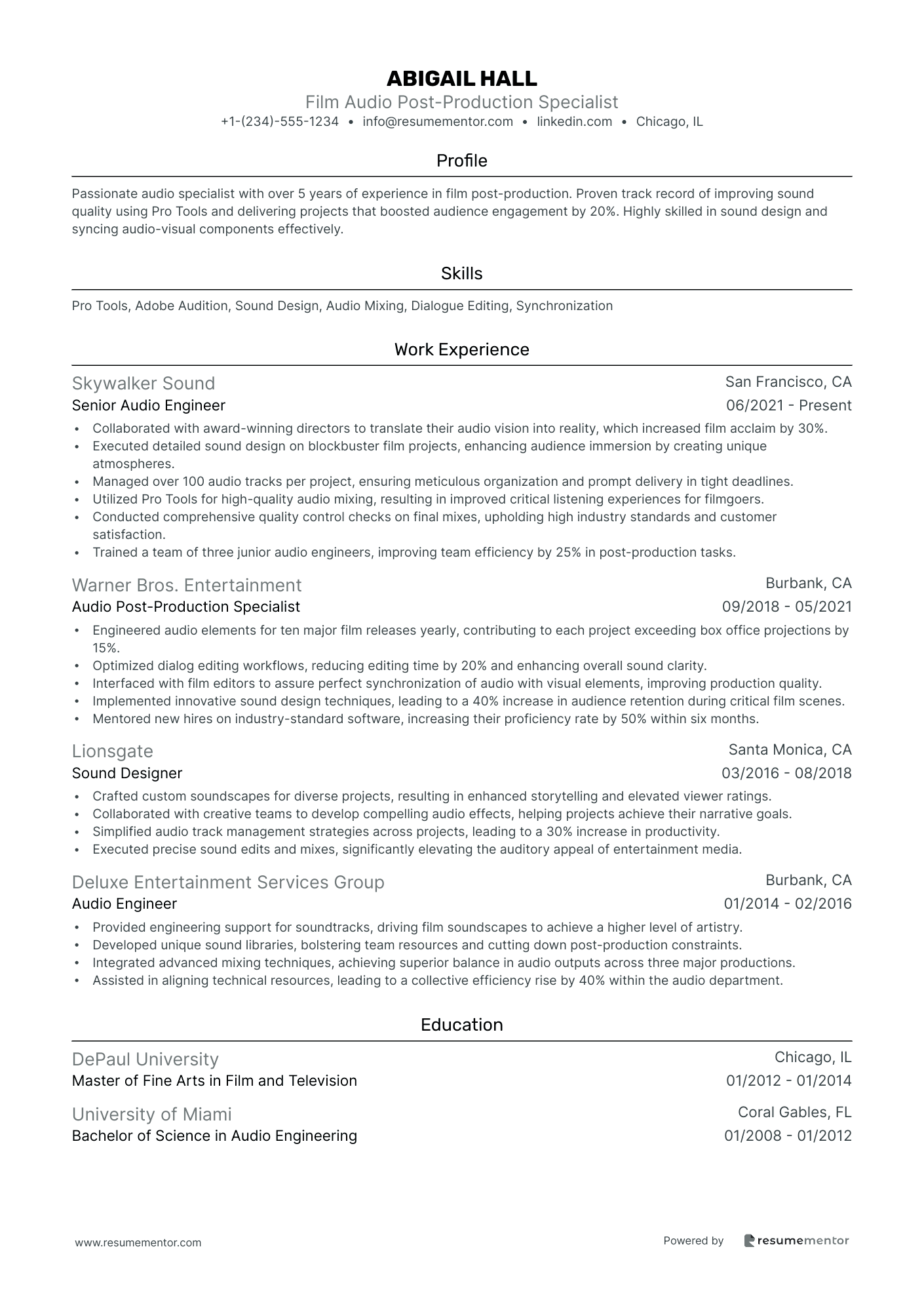
Film Audio Post-Production Specialist
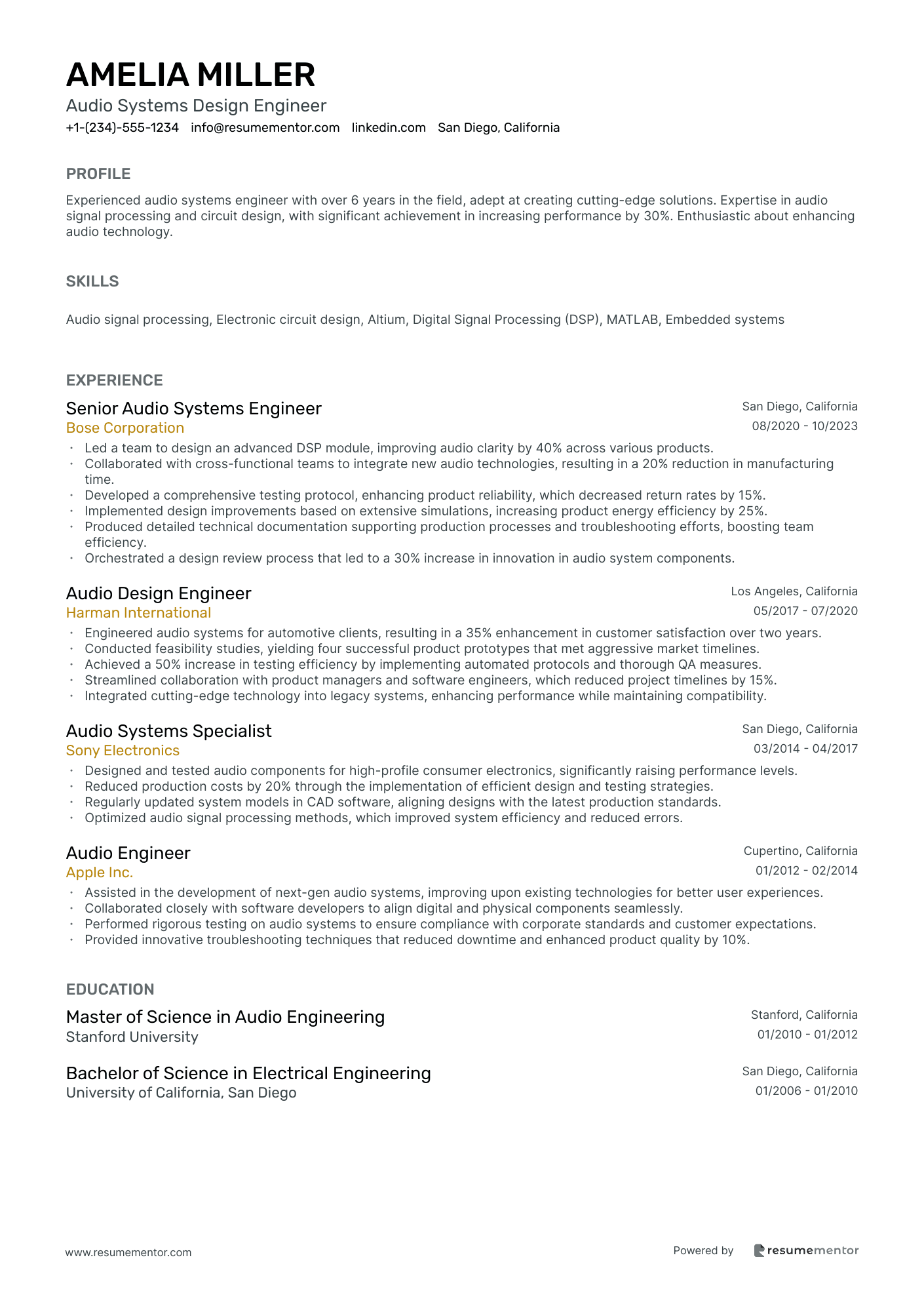
Audio Systems Design Engineer
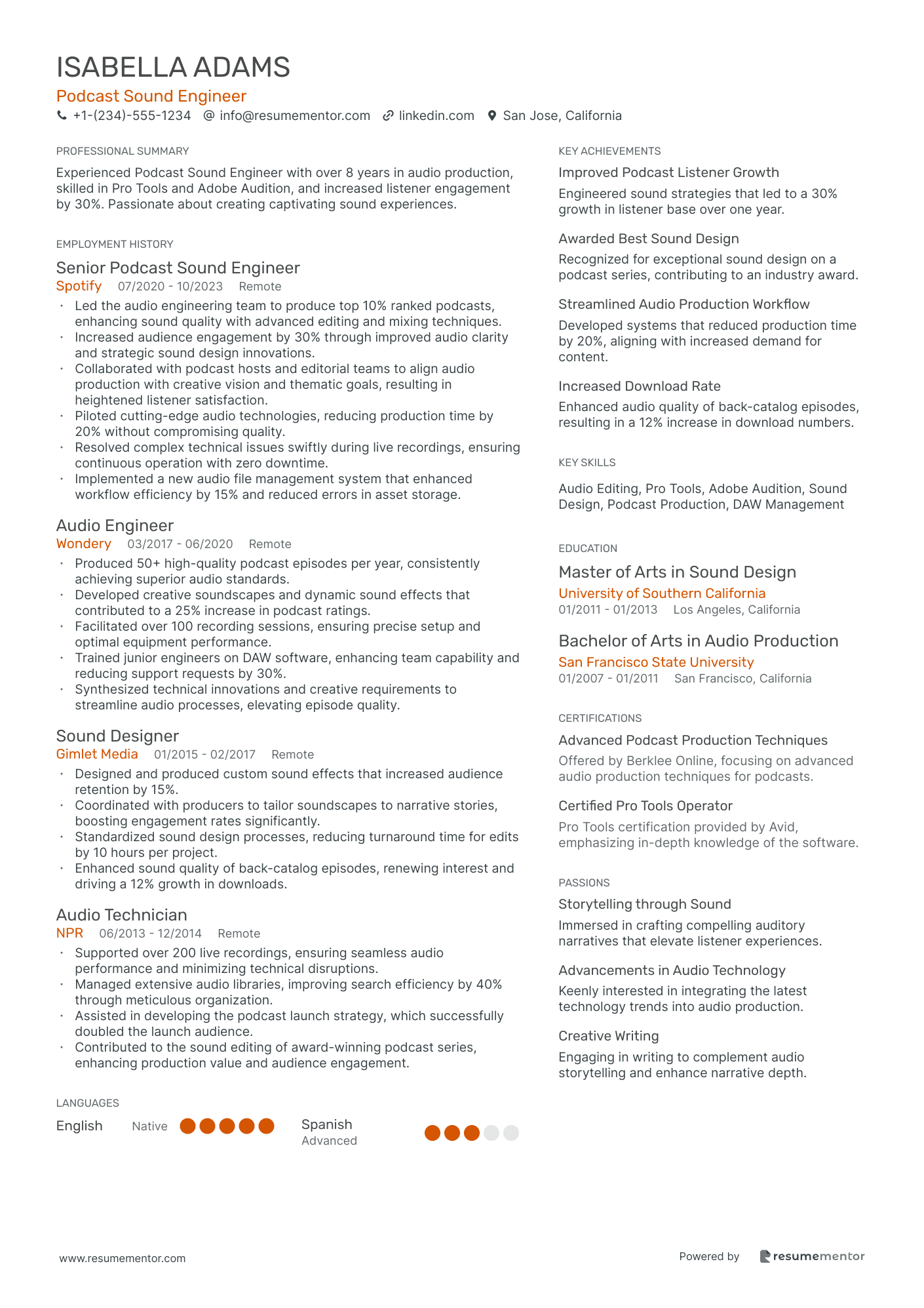
Podcast Sound Engineer
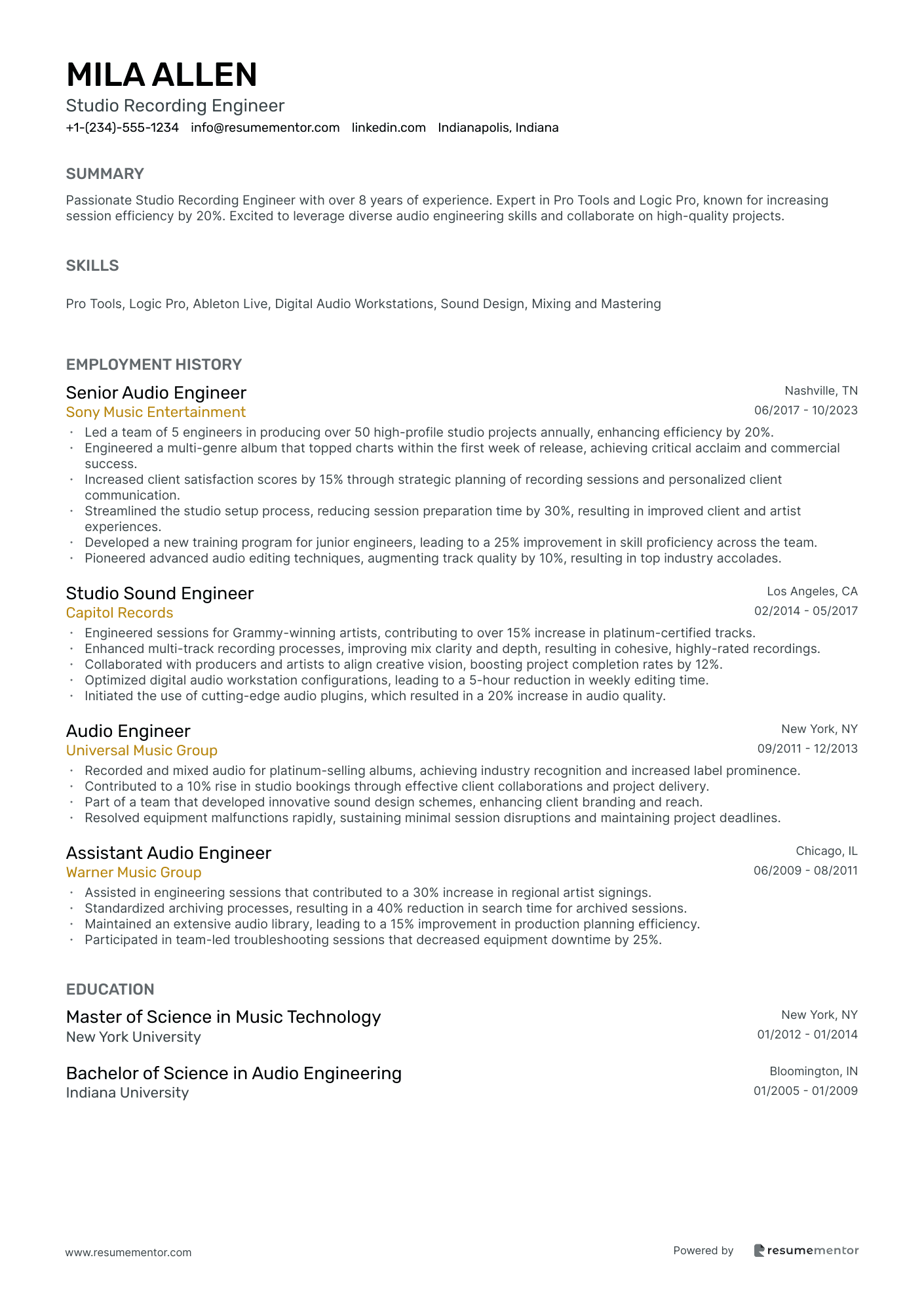
Studio Recording Engineer
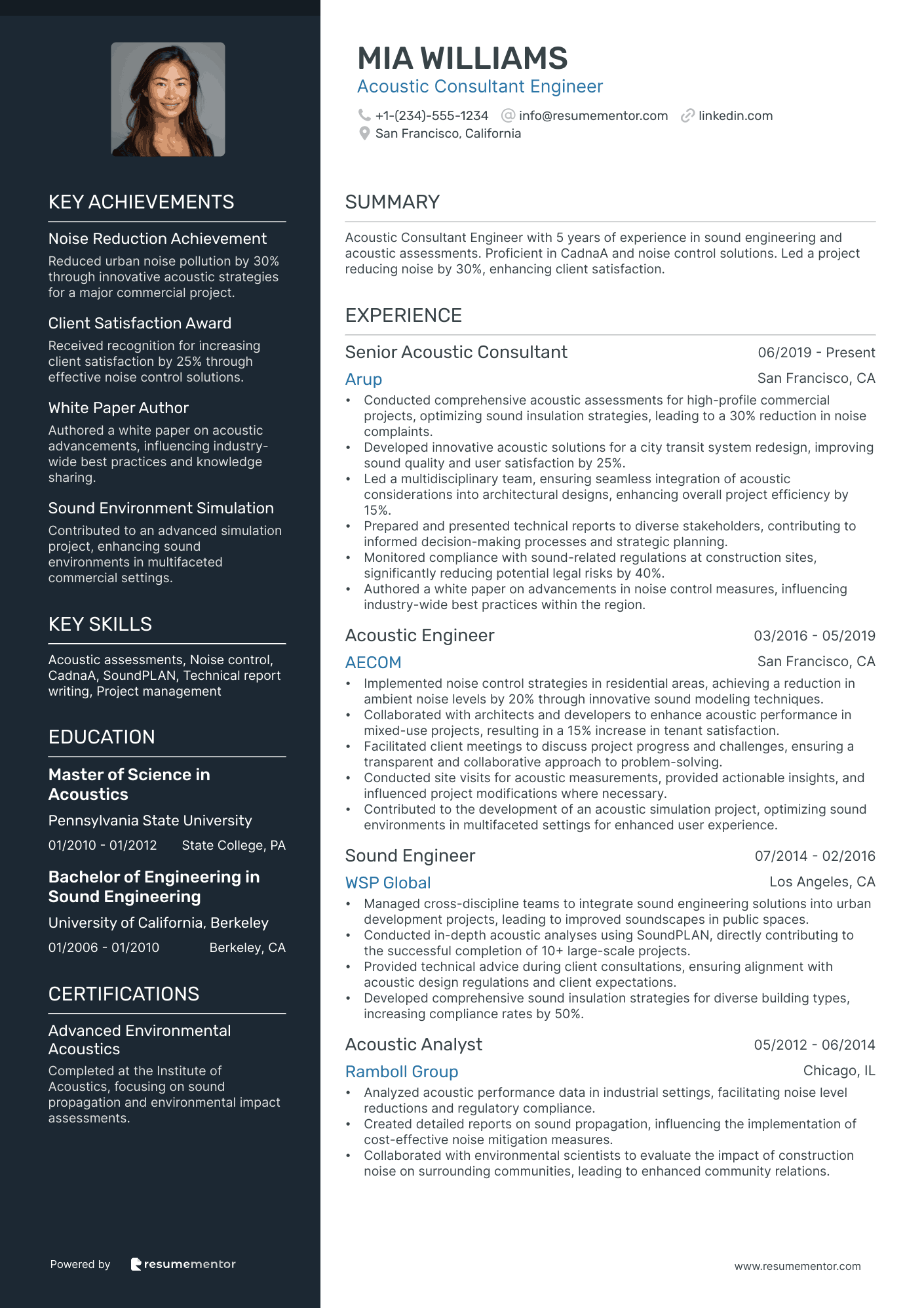
Acoustic Consultant Engineer
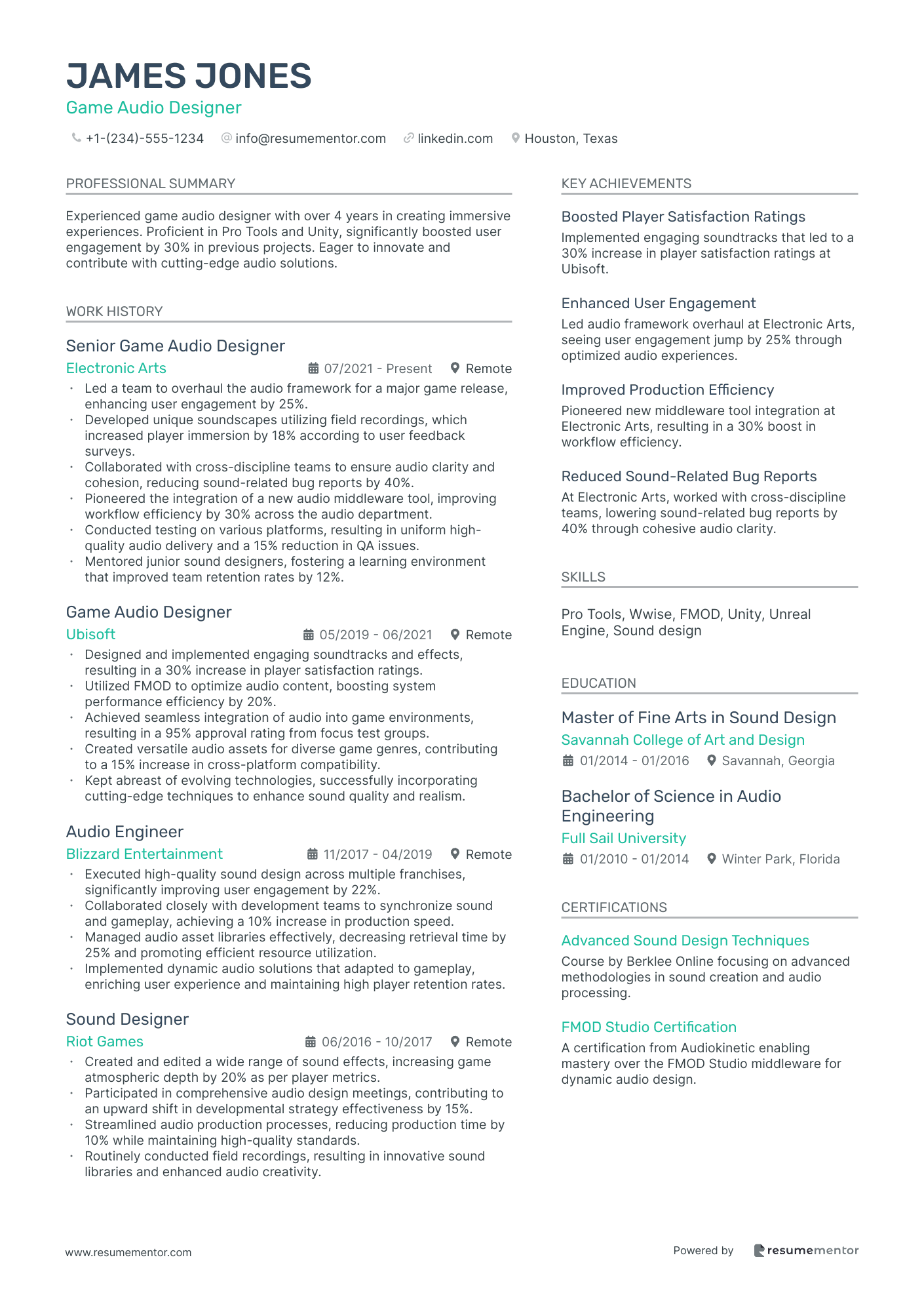
Game Audio Designer
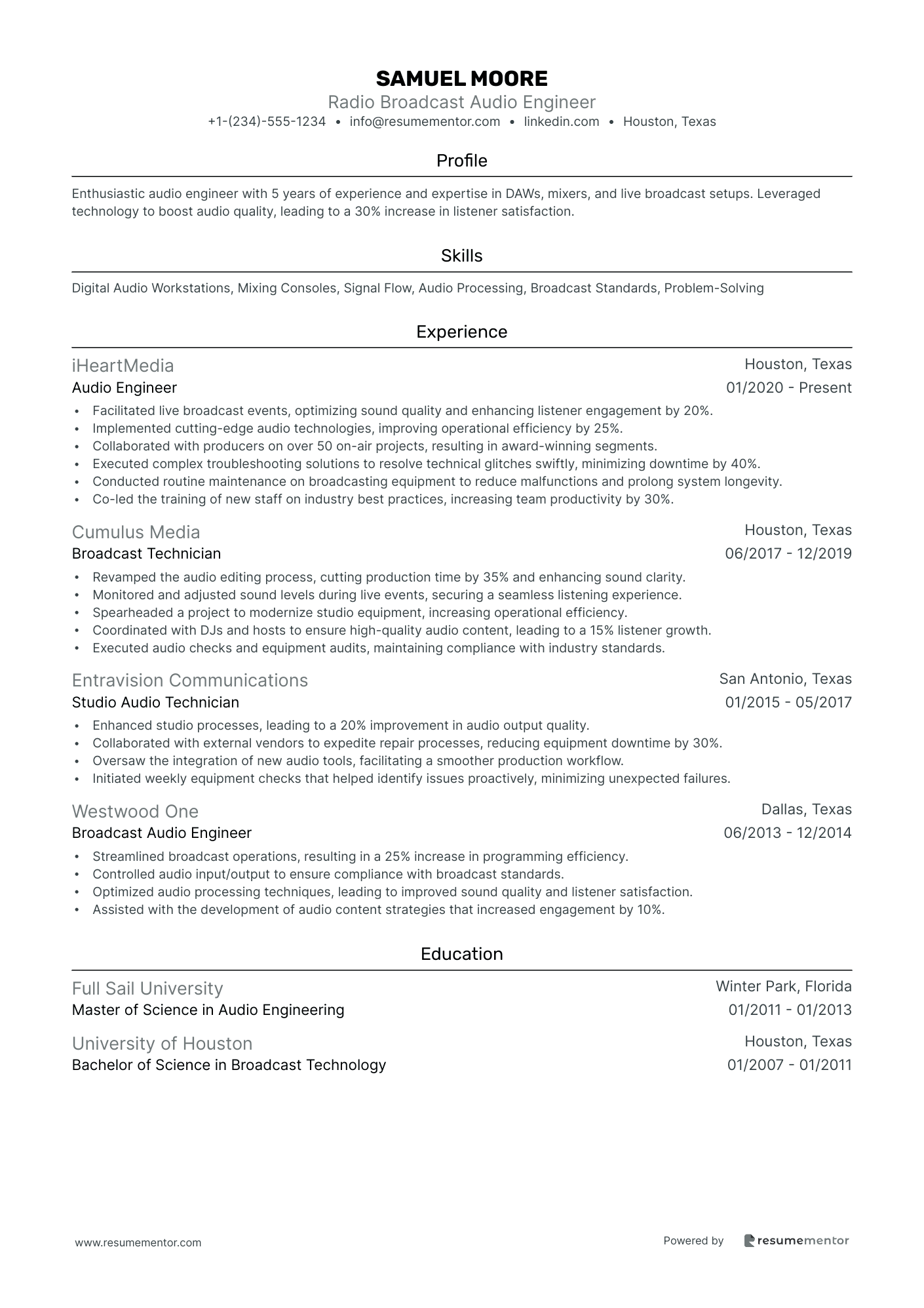
Radio Broadcast Audio Engineer
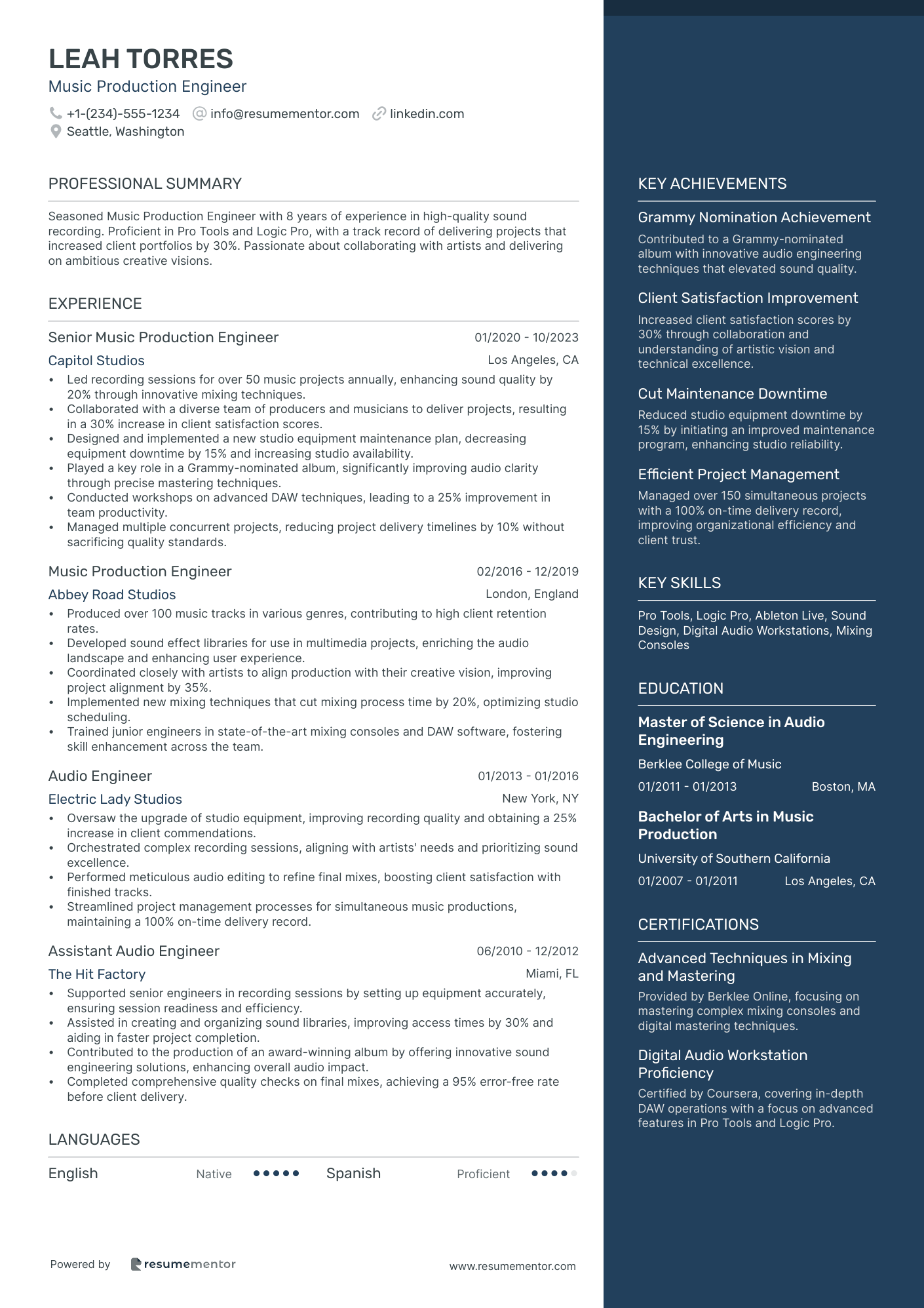
Music Production Engineer
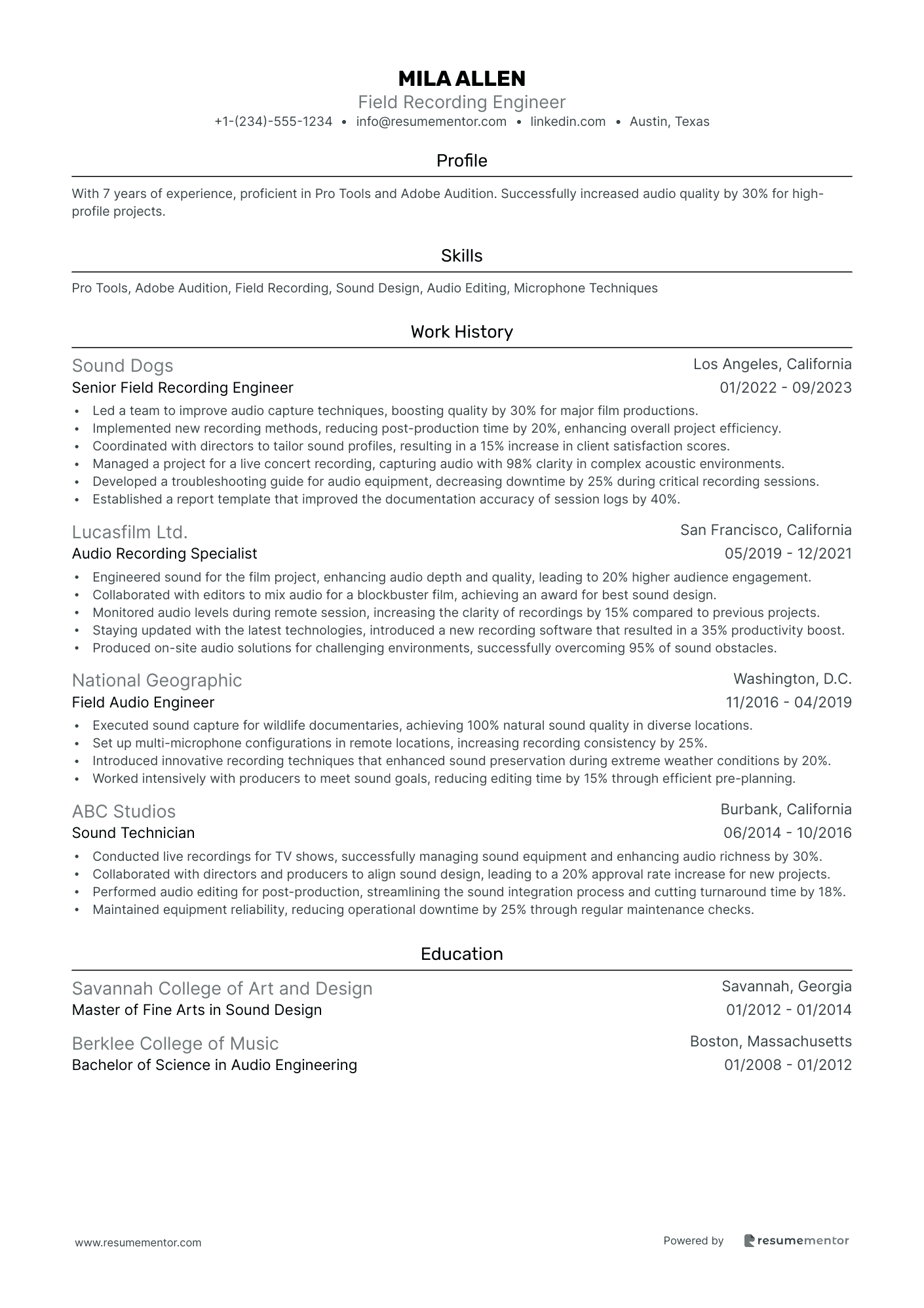
Field Recording Engineer

Film Audio Post-Production Specialist resume sample
- •Collaborated with award-winning directors to translate their audio vision into reality, which increased film acclaim by 30%.
- •Executed detailed sound design on blockbuster film projects, enhancing audience immersion by creating unique atmospheres.
- •Managed over 100 audio tracks per project, ensuring meticulous organization and prompt delivery in tight deadlines.
- •Utilized Pro Tools for high-quality audio mixing, resulting in improved critical listening experiences for filmgoers.
- •Conducted comprehensive quality control checks on final mixes, upholding high industry standards and customer satisfaction.
- •Trained a team of three junior audio engineers, improving team efficiency by 25% in post-production tasks.
- •Engineered audio elements for ten major film releases yearly, contributing to each project exceeding box office projections by 15%.
- •Optimized dialog editing workflows, reducing editing time by 20% and enhancing overall sound clarity.
- •Interfaced with film editors to assure perfect synchronization of audio with visual elements, improving production quality.
- •Implemented innovative sound design techniques, leading to a 40% increase in audience retention during critical film scenes.
- •Mentored new hires on industry-standard software, increasing their proficiency rate by 50% within six months.
- •Crafted custom soundscapes for diverse projects, resulting in enhanced storytelling and elevated viewer ratings.
- •Collaborated with creative teams to develop compelling audio effects, helping projects achieve their narrative goals.
- •Simplified audio track management strategies across projects, leading to a 30% increase in productivity.
- •Executed precise sound edits and mixes, significantly elevating the auditory appeal of entertainment media.
- •Provided engineering support for soundtracks, driving film soundscapes to achieve a higher level of artistry.
- •Developed unique sound libraries, bolstering team resources and cutting down post-production constraints.
- •Integrated advanced mixing techniques, achieving superior balance in audio outputs across three major productions.
- •Assisted in aligning technical resources, leading to a collective efficiency rise by 40% within the audio department.
Audio Systems Design Engineer resume sample
- •Led a team to design an advanced DSP module, improving audio clarity by 40% across various products.
- •Collaborated with cross-functional teams to integrate new audio technologies, resulting in a 20% reduction in manufacturing time.
- •Developed a comprehensive testing protocol, enhancing product reliability, which decreased return rates by 15%.
- •Implemented design improvements based on extensive simulations, increasing product energy efficiency by 25%.
- •Produced detailed technical documentation supporting production processes and troubleshooting efforts, boosting team efficiency.
- •Orchestrated a design review process that led to a 30% increase in innovation in audio system components.
- •Engineered audio systems for automotive clients, resulting in a 35% enhancement in customer satisfaction over two years.
- •Conducted feasibility studies, yielding four successful product prototypes that met aggressive market timelines.
- •Achieved a 50% increase in testing efficiency by implementing automated protocols and thorough QA measures.
- •Streamlined collaboration with product managers and software engineers, which reduced project timelines by 15%.
- •Integrated cutting-edge technology into legacy systems, enhancing performance while maintaining compatibility.
- •Designed and tested audio components for high-profile consumer electronics, significantly raising performance levels.
- •Reduced production costs by 20% through the implementation of efficient design and testing strategies.
- •Regularly updated system models in CAD software, aligning designs with the latest production standards.
- •Optimized audio signal processing methods, which improved system efficiency and reduced errors.
- •Assisted in the development of next-gen audio systems, improving upon existing technologies for better user experiences.
- •Collaborated closely with software developers to align digital and physical components seamlessly.
- •Performed rigorous testing on audio systems to ensure compliance with corporate standards and customer expectations.
- •Provided innovative troubleshooting techniques that reduced downtime and enhanced product quality by 10%.
Podcast Sound Engineer resume sample
- •Led the audio engineering team to produce top 10% ranked podcasts, enhancing sound quality with advanced editing and mixing techniques.
- •Increased audience engagement by 30% through improved audio clarity and strategic sound design innovations.
- •Collaborated with podcast hosts and editorial teams to align audio production with creative vision and thematic goals, resulting in heightened listener satisfaction.
- •Piloted cutting-edge audio technologies, reducing production time by 20% without compromising quality.
- •Resolved complex technical issues swiftly during live recordings, ensuring continuous operation with zero downtime.
- •Implemented a new audio file management system that enhanced workflow efficiency by 15% and reduced errors in asset storage.
- •Produced 50+ high-quality podcast episodes per year, consistently achieving superior audio standards.
- •Developed creative soundscapes and dynamic sound effects that contributed to a 25% increase in podcast ratings.
- •Facilitated over 100 recording sessions, ensuring precise setup and optimal equipment performance.
- •Trained junior engineers on DAW software, enhancing team capability and reducing support requests by 30%.
- •Synthesized technical innovations and creative requirements to streamline audio processes, elevating episode quality.
- •Designed and produced custom sound effects that increased audience retention by 15%.
- •Coordinated with producers to tailor soundscapes to narrative stories, boosting engagement rates significantly.
- •Standardized sound design processes, reducing turnaround time for edits by 10 hours per project.
- •Enhanced sound quality of back-catalog episodes, renewing interest and driving a 12% growth in downloads.
- •Supported over 200 live recordings, ensuring seamless audio performance and minimizing technical disruptions.
- •Managed extensive audio libraries, improving search efficiency by 40% through meticulous organization.
- •Assisted in developing the podcast launch strategy, which successfully doubled the launch audience.
- •Contributed to the sound editing of award-winning podcast series, enhancing production value and audience engagement.
Studio Recording Engineer resume sample
- •Led a team of 5 engineers in producing over 50 high-profile studio projects annually, enhancing efficiency by 20%.
- •Engineered a multi-genre album that topped charts within the first week of release, achieving critical acclaim and commercial success.
- •Increased client satisfaction scores by 15% through strategic planning of recording sessions and personalized client communication.
- •Streamlined the studio setup process, reducing session preparation time by 30%, resulting in improved client and artist experiences.
- •Developed a new training program for junior engineers, leading to a 25% improvement in skill proficiency across the team.
- •Pioneered advanced audio editing techniques, augmenting track quality by 10%, resulting in top industry accolades.
- •Engineered sessions for Grammy-winning artists, contributing to over 15% increase in platinum-certified tracks.
- •Enhanced multi-track recording processes, improving mix clarity and depth, resulting in cohesive, highly-rated recordings.
- •Collaborated with producers and artists to align creative vision, boosting project completion rates by 12%.
- •Optimized digital audio workstation configurations, leading to a 5-hour reduction in weekly editing time.
- •Initiated the use of cutting-edge audio plugins, which resulted in a 20% increase in audio quality.
- •Recorded and mixed audio for platinum-selling albums, achieving industry recognition and increased label prominence.
- •Contributed to a 10% rise in studio bookings through effective client collaborations and project delivery.
- •Part of a team that developed innovative sound design schemes, enhancing client branding and reach.
- •Resolved equipment malfunctions rapidly, sustaining minimal session disruptions and maintaining project deadlines.
- •Assisted in engineering sessions that contributed to a 30% increase in regional artist signings.
- •Standardized archiving processes, resulting in a 40% reduction in search time for archived sessions.
- •Maintained an extensive audio library, leading to a 15% improvement in production planning efficiency.
- •Participated in team-led troubleshooting sessions that decreased equipment downtime by 25%.
Acoustic Consultant Engineer resume sample
- •Conducted comprehensive acoustic assessments for high-profile commercial projects, optimizing sound insulation strategies, leading to a 30% reduction in noise complaints.
- •Developed innovative acoustic solutions for a city transit system redesign, improving sound quality and user satisfaction by 25%.
- •Led a multidisciplinary team, ensuring seamless integration of acoustic considerations into architectural designs, enhancing overall project efficiency by 15%.
- •Prepared and presented technical reports to diverse stakeholders, contributing to informed decision-making processes and strategic planning.
- •Monitored compliance with sound-related regulations at construction sites, significantly reducing potential legal risks by 40%.
- •Authored a white paper on advancements in noise control measures, influencing industry-wide best practices within the region.
- •Implemented noise control strategies in residential areas, achieving a reduction in ambient noise levels by 20% through innovative sound modeling techniques.
- •Collaborated with architects and developers to enhance acoustic performance in mixed-use projects, resulting in a 15% increase in tenant satisfaction.
- •Facilitated client meetings to discuss project progress and challenges, ensuring a transparent and collaborative approach to problem-solving.
- •Conducted site visits for acoustic measurements, provided actionable insights, and influenced project modifications where necessary.
- •Contributed to the development of an acoustic simulation project, optimizing sound environments in multifaceted settings for enhanced user experience.
- •Managed cross-discipline teams to integrate sound engineering solutions into urban development projects, leading to improved soundscapes in public spaces.
- •Conducted in-depth acoustic analyses using SoundPLAN, directly contributing to the successful completion of 10+ large-scale projects.
- •Provided technical advice during client consultations, ensuring alignment with acoustic design regulations and client expectations.
- •Developed comprehensive sound insulation strategies for diverse building types, increasing compliance rates by 50%.
- •Analyzed acoustic performance data in industrial settings, facilitating noise level reductions and regulatory compliance.
- •Created detailed reports on sound propagation, influencing the implementation of cost-effective noise mitigation measures.
- •Collaborated with environmental scientists to evaluate the impact of construction noise on surrounding communities, leading to enhanced community relations.
Game Audio Designer resume sample
- •Led a team to overhaul the audio framework for a major game release, enhancing user engagement by 25%.
- •Developed unique soundscapes utilizing field recordings, which increased player immersion by 18% according to user feedback surveys.
- •Collaborated with cross-discipline teams to ensure audio clarity and cohesion, reducing sound-related bug reports by 40%.
- •Pioneered the integration of a new audio middleware tool, improving workflow efficiency by 30% across the audio department.
- •Conducted testing on various platforms, resulting in uniform high-quality audio delivery and a 15% reduction in QA issues.
- •Mentored junior sound designers, fostering a learning environment that improved team retention rates by 12%.
- •Designed and implemented engaging soundtracks and effects, resulting in a 30% increase in player satisfaction ratings.
- •Utilized FMOD to optimize audio content, boosting system performance efficiency by 20%.
- •Achieved seamless integration of audio into game environments, resulting in a 95% approval rating from focus test groups.
- •Created versatile audio assets for diverse game genres, contributing to a 15% increase in cross-platform compatibility.
- •Kept abreast of evolving technologies, successfully incorporating cutting-edge techniques to enhance sound quality and realism.
- •Executed high-quality sound design across multiple franchises, significantly improving user engagement by 22%.
- •Collaborated closely with development teams to synchronize sound and gameplay, achieving a 10% increase in production speed.
- •Managed audio asset libraries effectively, decreasing retrieval time by 25% and promoting efficient resource utilization.
- •Implemented dynamic audio solutions that adapted to gameplay, enriching user experience and maintaining high player retention rates.
- •Created and edited a wide range of sound effects, increasing game atmospheric depth by 20% as per player metrics.
- •Participated in comprehensive audio design meetings, contributing to an upward shift in developmental strategy effectiveness by 15%.
- •Streamlined audio production processes, reducing production time by 10% while maintaining high-quality standards.
- •Routinely conducted field recordings, resulting in innovative sound libraries and enhanced audio creativity.
Radio Broadcast Audio Engineer resume sample
- •Facilitated live broadcast events, optimizing sound quality and enhancing listener engagement by 20%.
- •Implemented cutting-edge audio technologies, improving operational efficiency by 25%.
- •Collaborated with producers on over 50 on-air projects, resulting in award-winning segments.
- •Executed complex troubleshooting solutions to resolve technical glitches swiftly, minimizing downtime by 40%.
- •Conducted routine maintenance on broadcasting equipment to reduce malfunctions and prolong system longevity.
- •Co-led the training of new staff on industry best practices, increasing team productivity by 30%.
- •Revamped the audio editing process, cutting production time by 35% and enhancing sound clarity.
- •Monitored and adjusted sound levels during live events, securing a seamless listening experience.
- •Spearheaded a project to modernize studio equipment, increasing operational efficiency.
- •Coordinated with DJs and hosts to ensure high-quality audio content, leading to a 15% listener growth.
- •Executed audio checks and equipment audits, maintaining compliance with industry standards.
- •Enhanced studio processes, leading to a 20% improvement in audio output quality.
- •Collaborated with external vendors to expedite repair processes, reducing equipment downtime by 30%.
- •Oversaw the integration of new audio tools, facilitating a smoother production workflow.
- •Initiated weekly equipment checks that helped identify issues proactively, minimizing unexpected failures.
- •Streamlined broadcast operations, resulting in a 25% increase in programming efficiency.
- •Controlled audio input/output to ensure compliance with broadcast standards.
- •Optimized audio processing techniques, leading to improved sound quality and listener satisfaction.
- •Assisted with the development of audio content strategies that increased engagement by 10%.
Music Production Engineer resume sample
- •Led recording sessions for over 50 music projects annually, enhancing sound quality by 20% through innovative mixing techniques.
- •Collaborated with a diverse team of producers and musicians to deliver projects, resulting in a 30% increase in client satisfaction scores.
- •Designed and implemented a new studio equipment maintenance plan, decreasing equipment downtime by 15% and increasing studio availability.
- •Played a key role in a Grammy-nominated album, significantly improving audio clarity through precise mastering techniques.
- •Conducted workshops on advanced DAW techniques, leading to a 25% improvement in team productivity.
- •Managed multiple concurrent projects, reducing project delivery timelines by 10% without sacrificing quality standards.
- •Produced over 100 music tracks in various genres, contributing to high client retention rates.
- •Developed sound effect libraries for use in multimedia projects, enriching the audio landscape and enhancing user experience.
- •Coordinated closely with artists to align production with their creative vision, improving project alignment by 35%.
- •Implemented new mixing techniques that cut mixing process time by 20%, optimizing studio scheduling.
- •Trained junior engineers in state-of-the-art mixing consoles and DAW software, fostering skill enhancement across the team.
- •Oversaw the upgrade of studio equipment, improving recording quality and obtaining a 25% increase in client commendations.
- •Orchestrated complex recording sessions, aligning with artists' needs and prioritizing sound excellence.
- •Performed meticulous audio editing to refine final mixes, boosting client satisfaction with finished tracks.
- •Streamlined project management processes for simultaneous music productions, maintaining a 100% on-time delivery record.
- •Supported senior engineers in recording sessions by setting up equipment accurately, ensuring session readiness and efficiency.
- •Assisted in creating and organizing sound libraries, improving access times by 30% and aiding in faster project completion.
- •Contributed to the production of an award-winning album by offering innovative sound engineering solutions, enhancing overall audio impact.
- •Completed comprehensive quality checks on final mixes, achieving a 95% error-free rate before client delivery.
Field Recording Engineer resume sample
- •Led a team to improve audio capture techniques, boosting quality by 30% for major film productions.
- •Implemented new recording methods, reducing post-production time by 20%, enhancing overall project efficiency.
- •Coordinated with directors to tailor sound profiles, resulting in a 15% increase in client satisfaction scores.
- •Managed a project for a live concert recording, capturing audio with 98% clarity in complex acoustic environments.
- •Developed a troubleshooting guide for audio equipment, decreasing downtime by 25% during critical recording sessions.
- •Established a report template that improved the documentation accuracy of session logs by 40%.
- •Engineered sound for the film project, enhancing audio depth and quality, leading to 20% higher audience engagement.
- •Collaborated with editors to mix audio for a blockbuster film, achieving an award for best sound design.
- •Monitored audio levels during remote session, increasing the clarity of recordings by 15% compared to previous projects.
- •Staying updated with the latest technologies, introduced a new recording software that resulted in a 35% productivity boost.
- •Produced on-site audio solutions for challenging environments, successfully overcoming 95% of sound obstacles.
- •Executed sound capture for wildlife documentaries, achieving 100% natural sound quality in diverse locations.
- •Set up multi-microphone configurations in remote locations, increasing recording consistency by 25%.
- •Introduced innovative recording techniques that enhanced sound preservation during extreme weather conditions by 20%.
- •Worked intensively with producers to meet sound goals, reducing editing time by 15% through efficient pre-planning.
- •Conducted live recordings for TV shows, successfully managing sound equipment and enhancing audio richness by 30%.
- •Collaborated with directors and producers to align sound design, leading to a 20% approval rate increase for new projects.
- •Performed audio editing for post-production, streamlining the sound integration process and cutting turnaround time by 18%.
- •Maintained equipment reliability, reducing operational downtime by 25% through regular maintenance checks.
As an audio engineer, you work magic behind the soundboard, shaping the world of sound with your skills. But when it comes to writing a resume, it can feel like tuning a foreign instrument. Translating your talents into words might not come naturally, especially when every detail matters.
Your resume isn't just a list—it's a spotlight on your abilities, from mastering mixes to handling intricate sound systems. Employers are interested in more than just what you've accomplished; they want to understand the depth of your expertise. This is where connecting your technical know-how to specific job requirements becomes essential.
A resume template provides the structure needed to effectively showcase your experience and skills in audio engineering. By using a resume template, you can ensure your abilities are presented clearly and harmoniously—much like layering sounds to create a seamless mix.
Translating your projects and accomplishments into concise lines might seem daunting, but focusing on clarity helps. Avoid industry jargon and instead frame your success in terms that resonate with hiring managers.
This guide will help you fine-tune your resume so it hits the right notes with potential employers. You'll learn how to balance creativity with clarity, ensuring your talents stand out. With a well-crafted resume, you’re on your way to finding your next opportunity.
Key Takeaways
- When writing a teacher resume, it is crucial to clearly convey your educational philosophy, teaching style, and ability to impact student learning outcomes positively.
- Highlight your teaching certifications, educational background, and any awards or recognitions received to solidify your credentials as an educator.
- Emphasize your classroom management skills and ability to adapt teaching methods to cater to diverse student needs, ensuring an inclusive learning environment.
- Include measurable achievements such as improved student performance statistics or successful curriculum implementation to demonstrate your effectiveness as a teacher.
- Use a clean, professional resume layout and prioritize sections based on the job description, tailoring each application to align with the employer's priorities.
What to focus on when writing your audio engineer resume
An audio engineer resume should effectively convey your technical skills, creativity, and experience in sound design and recording—demonstrating your ability to enhance projects and collaborate with artists and producers to achieve the best sound quality.
How to structure your audio engineer resume
- Contact Information: Start with your full name, phone number, email, and LinkedIn profile—ensuring these details are clear and easy to find enables recruiters to reach out smoothly. Consider adding your city and state, particularly if you're aiming for a role where location matters. This sets the stage for the rest of your resume to make an impression.
- Professional Summary: This brief overview should highlight your years of experience, key achievements, and passion for sound production—it acts as a headline for your resume, drawing the reader in and piquing interest in your depth of expertise. A strong, concise summary lays a foundation for the experience and skills that follow.
- Skills: Following your summary, list audio-specific talents such as sound mixing, mastering, and proficiency with digital audio workstations like Pro Tools—it's essential that these skills demonstrate both your technical capability and understanding of industry-standard equipment. Your skills section blends seamlessly into your practical experiences, proving your hands-on expertise.
- Experience: Build on your skills section by detailing your previous roles and responsibilities in order of most recent first—this gives prospective employers evidence of what you’ve accomplished and how you contributed in past positions. Emphasizing projects or albums you've worked on, especially with notable artists, showcases tangible impacts you've made.
- Education and Certifications: Provide your academic background and any certifications, showing a commitment to education and growth in the field of audio engineering. Highlighting relevant courses and certifications demonstrates your dedication to keeping up with industry advancements and ensures continuous improvement in your technique.
- Projects: Highlight significant audio projects you've completed, emphasizing your role and the skills applied—this section serves as a practical testament to your capabilities and complements the insights of your experience section. Your projects illustrate the challenge, your approach, and the outcome, painting a full picture of your problem-solving skills and creative impact.
As we explore how to format each section of your resume in detail, understanding the connection between these elements will help you create a cohesive and compelling professional profile.
Which resume format to choose
Creating an audio engineer resume involves making thoughtful choices about every detail, starting with the format. A reverse-chronological layout is particularly effective because it showcases your recent projects and experience, providing a clear snapshot of your development and expertise in a fast-evolving field.
Your font choice is more than just a design element; it reflects your professionalism and attention to detail. Opting for modern fonts like Rubik, Lato, or Montserrat not only helps your resume stand out but also ensures readability, which is crucial in presenting your technical skills and achievements clearly.
Another critical aspect is the file type in which you save your resume. PDFs are essential because they lock in your formatting and design, ensuring that prospective employers see your resume exactly as you intended, regardless of the software or device they use. This consistency underscores your tech-savvy nature, a desirable trait in your field.
Margins might seem minor, but they affect the overall readability of your resume. Keeping them at about one inch gives your content room to breathe, allowing employers to easily navigate through your qualifications and experiences without feeling overwhelmed by a wall of text.
Together, these considerations form the backbone of a well-crafted audio engineer resume, helping you communicate your skills and achievements effectively.
How to write a quantifiable resume experience section
An effective audio engineer resume experience section highlights your achievements and shows your ability to meet the needs of the job. Begin with your current or most recent position and work backward in reverse chronological order. It's important to focus on roles directly related to audio engineering, while tweaking your resume for each application to align with the skills listed in the job ad. Using powerful action words like "designed," "produced," "optimized," and "implemented" can make your expertise stand out. Keep this section limited to the last 10-15 years, ensuring that you include only job titles that strengthen your qualifications for the role you want.
- •Engineered sound for over 100 tracks, boosting client satisfaction scores by 25%.
- •Streamlined recording processes, cutting production time by 15% per project.
- •Worked with a team of 10 to craft custom soundscapes for award-winning films.
- •Pioneered mixing techniques that enhanced audio clarity by 30%.
The experience section above effectively weaves together measurable achievements to highlight your success in audio engineering. Each bullet point demonstrates real impact, such as boosting client satisfaction and cutting production time, painting a clear picture of how you've made a difference in your past roles. By using action words, you vividly illustrate your skills and impact, which is crucial for capturing an employer's attention. Presenting your roles and accomplishments this way not only emphasizes your value but also positions you as a strong candidate for any audio engineering job. Tailoring your experience section to the job ad keeps it relevant while maximizing the presentation of your professional achievements.
Problem-Solving Focused resume experience section
A problem-solving-focused audio engineer resume experience section should effectively highlight your ability to tackle challenges in the audio engineering field. Begin with examples where your expertise made a significant impact on project outcomes. Detail how your actions led to better sound quality, solved technical problems, or improved production workflows, illustrating your quick thinking and adaptability in dynamic situations.
To make your achievements stand out, include measurable outcomes that show your contributions clearly. Share stories of how you optimized studio operations, collaborated with colleagues to solve complicated issues, or executed precise audio adjustments. This approach not only showcases your technical skills but also your ability to work well under pressure. Specify the technologies and methods you employed, focusing on what makes your experience unique and valuable.
Audio Engineer
SoundWave Productions
June 2020 - August 2023
- Resolved sound feedback issues during live events, ensuring clear audio for gatherings of up to 5,000 people.
- Worked with event teams to set up and fine-tune audio equipment, achieving excellent sound quality in various venues.
- Introduced new digital mixing technologies to streamline soundchecks, cutting setup time by 20%.
- Handled technical issues on-the-spot, keeping disruptions to a minimum during live performances.
Achievement-Focused resume experience section
A well-crafted achievement-focused audio engineer resume experience section should effectively highlight your contributions and successes in the field. Start by clearly stating the time frame of each role and summarizing your key responsibilities. Make sure to describe the projects you were involved in, using action verbs to bring your accomplishments to life. Quantifying your achievements, such as the number of tracks you engineered or any awards received, adds a powerful punch to your resume. Tailor each section to align with the job you're applying for, focusing on the most relevant experiences.
To ensure your resume stands out, emphasize the unique contributions you’ve made and the positive changes you've achieved. Illustrate how you introduced new techniques, resolved technical challenges, or increased efficiency, demonstrating the concrete benefits for employers and artists. By weaving together these specific, quantifiable examples, your experience section will clearly communicate the value you bring, ensuring a strong impression on potential employers.
Audio Engineer
SoundWave Studios
June 2019 - Present
- Engineered and mixed over 200 tracks for diverse artists, boosting client satisfaction by 30%.
- Streamlined project workflow, cutting down completion time by 20% and enhancing studio productivity.
- Integrated advanced audio processing software which improved sound quality by 15% for prominent clients.
- Mentored 5 junior engineers, contributing to talent development and overall team growth.
Growth-Focused resume experience section
A growth-focused audio engineer resume experience section should clearly demonstrate your ability to drive positive change and spearhead innovation. Start by highlighting your specific achievements, using action verbs to effectively convey how you've made an impact. As you detail your experiences, tailor each entry to emphasize how you've advanced the organization's objectives. Including measurable results, such as increased efficiency or improved sound quality, helps potential employers appreciate your contributions.
Build on this by showcasing your adaptability across various audio projects. Highlight your involvement with new technologies that signifies your commitment to staying current in the industry. Illustrate your collaborative work with artists, producers, or fellow engineers to underscore your teamwork skills. By weaving these elements together, you present a cohesive picture of your dedication to career growth and continuous improvement.
Lead Audio Engineer
Midtown Music
June 2020 - Present
- Enhanced sound quality at live events, boosting audience satisfaction scores by 25%
- Streamlined setup efficiency by 40% through innovative sound system implementation
- Worked closely with artists to create personalized sound profiles, elevating performance quality
- Led a team of three to troubleshoot and resolve technical issues under tight timelines
Innovation-Focused resume experience section
An innovation-focused audio engineer resume experience section should highlight your ability to drive change and creativity in your projects. Begin by showcasing how you embrace new technologies and experiment with different audio techniques. Share stories where your innovative mindset led to better sound quality or streamlined workflows. Use action words like "developed," "enhanced," and "pioneered" to clearly demonstrate your proactive role as an innovator in the industry.
Next, bring attention to experiences that underline your creative problem-solving abilities. Discuss projects where you successfully introduced cutting-edge technology or improved sound through unique methods. Include examples of successful teamwork with other creatives, revealing how your innovative approach made a real difference. Keep your bullet points clear and engaging, making sure each one highlights the impact of your innovative contributions.
Lead Audio Engineer
SoundWave Innovations
January 2020 - Present
- Pioneered the integration of AI algorithms in live sound settings, enhancing audio clarity and reducing feedback.
- Developed a customizable audio effects library, making it easier for sound designers to access new tools.
- Enhanced recording techniques by utilizing immersive sound environments, boosting client satisfaction by 15%.
- Collaborated with software developers on a real-time audio modulation app now used by 30+ industry professionals.
Write your audio engineer resume summary section
A resume summary for an audio engineer should create a compelling picture of your career. It’s crucial to blend both your technical skills and creative flair. Your summary should showcase your strengths and unique talents in simple language. When you do this, it sets you apart from others in the field. A well-crafted summary provides a snapshot of your professional journey and your ability to adapt in various environments. Consider this engaging resume summary for an audio engineer:
This summary not only outlines specific skills and software expertise but also emphasizes teamwork and innovation. To effectively describe yourself, use active language and let your strengths shine. Keep it informative yet concise. It’s important to know the difference between a summary, an objective, a profile, and a summary of qualifications. While a resume summary is ideal for experienced candidates, offering a quick view of skills and achievements, a resume objective is better suited for those new to the field, focusing on career goals. A resume profile combines these aspects, highlighting both skills and aspirations. Lastly, a summary of qualifications uses bullet points to showcase key achievements. Selecting the right format can help you present your strengths effectively and align with your career goals.
Listing your audio engineer skills on your resume
A skills-focused audio engineer resume highlights what makes you stand out in the field. The skills section can be a standalone feature or woven into your experience and summary sections. Addressing strengths and soft skills is essential because they showcase your ability to collaborate, communicate effectively, and adapt to changes. Meanwhile, hard skills are the technical abilities needed for the role, like operating audio software and equipment efficiently.
These skills and strengths act as crucial resume keywords, helping you attract the attention of employers and navigate applicant tracking systems effectively. By aligning these keywords with job descriptions, you boost your chances of catching a recruiter's eye.
This example illustrates a well-rounded set of skills crucial for an audio engineer. Each skill is precise and applicable, reflecting the expertise required in the field. The section’s clarity and focus make your technical capabilities evident to hiring managers.
Best hard skills to feature on your audio engineer resume
Hard skills are your technical competencies necessary for success in audio engineering. They convey your expertise and depth of understanding. Below are some key hard skills in demand for audio engineers:
Hard Skills
- Audio Mixing
- Sound Design
- Pro Tools proficiency
- Digital Audio Workstations (DAWs)
- Microphone Techniques
- Sound Editing
- Live Sound Production
- Signal Flow Optimization
- Mastering Techniques
- Acoustics
- Audio Recording
- Foley Artistry
- Surround Sound Mixing
- MIDI Programming
- Troubleshooting Audio Equipment
Best soft skills to feature on your audio engineer resume
Soft skills are equally important as they demonstrate your ability to connect and work with others. Highlighting these skills shows your capability to adapt and collaborate. Here are some essential soft skills for audio engineers:
Soft Skills
- Communication
- Teamwork
- Problem-solving
- Creativity
- Adaptability
- Attention to Detail
- Time Management
- Critical Thinking
- Patience
- Collaboration
- Initiative
- Active Listening
- Negotiation
- Stress Management
- Empathy
How to include your education on your resume
The education section of your resume is a crucial part that showcases your academic background and qualifications. It should be tailored to the audio engineer position you're eyeing. Include only relevant educational experiences that align with the job. When detailing your education, you can add your GPA if it's impressive (typically above 3.0). To highlight academic honors, write "cum laude" on your resume alongside your degree. Format your degree by listing the title of the degree you obtained, the name of the institution, and the date of graduation.
Here’s a wrong example:
And now, here's a right example:
The right example stands out because it focuses on relevant education for an audio engineering role. The listing of "Bachelor of Science in Audio Engineering" is directly related to the job, and the cum laude honors showcase academic excellence. Additionally, including a strong GPA of 3.8 highlights a high level of achievement in a specialized field, making it appealing to employers. This structured approach helps communicate your readiness and qualifications for the job effectively.
How to include audio engineer certificates on your resume
Including a certificates section in your audio engineer resume is essential. Certifications validate your skills and can impress potential employers. List the name of the certification first to catch attention. Include the date of completion to show its relevance. Add the issuing organization to give credibility. You can include the certificates section in the resume header for quick visibility.
Example certificates in the header might look like this:
An excellent standalone certificates section could be:
[here was the JSON object 2]
This example is effective because it includes relevant certifications for an audio engineer. The names are clearly listed, the issuing organizations are credible, and the certifications are in line with common industry standards. This structure makes your capabilities clear and easy to verify.
Extra sections to include in your audio engineer resume
Crafting a compelling resume is a critical step in securing a job as an audio engineer. You want to highlight skills, experiences, and attributes that show you as the ideal candidate.
- Language section — Show any languages you speak to communicate effectively with diverse teams and clients. Demonstrate this skill to impress employers looking for versatile employees.
- Hobbies and interests section — Highlight hobbies like playing musical instruments to show your passion for sound and creativity. Link your interests to your career to make your resume more engaging.
- Volunteer work section — Showcase any volunteer experiences, such as offering audio services for community events, to highlight your dedication. Demonstrate your commitment to giving back, which can make a strong impression.
- Books section — List any books you've read about audio engineering to illustrate your eagerness to learn. Mentioning specific titles can show your deep interest and knowledge in your field.
In Conclusion
In conclusion, crafting an effective audio engineer resume requires you to artfully combine your technical abilities with your creative flair. A well-structured resume serves as more than just a listing of your experiences—it acts as a dynamic showcase of your talents, adaptability, and industry expertise. By highlighting your specific skills through clear, concise language, you provide potential employers with an insight into your unique capabilities. It's important to focus on both hard and soft skills, presenting yourself as both a technical expert and a team player. Tailoring your resume for each job application enhances its impact, ensuring alignment with the specific role's requirements.
Including additional sections like certifications, languages, or hobbies can further distinguish you from your peers, offering a broader view of what you bring beyond your technical skills. Education and certifications are not just paperwork; they represent your commitment to your craft and continuous improvement. Whether it's a degree in audio engineering, notable certifications, or a project with measurable success, these elements contribute significantly to your candidacy. Remember, your resume is your personal brand in the world of audio engineering—present it with precision and creativity to step into your next opportunity with confidence.
Related Articles

Continue Reading
Check more recommended readings to get the job of your dreams.
Resume
Resources
Tools
© 2026. All rights reserved.
Made with love by people who care.

